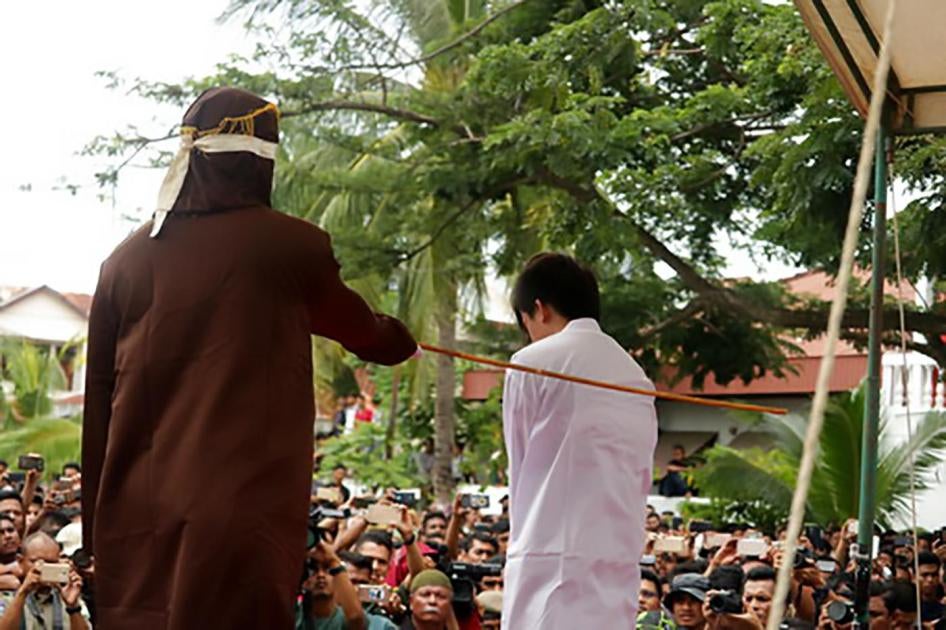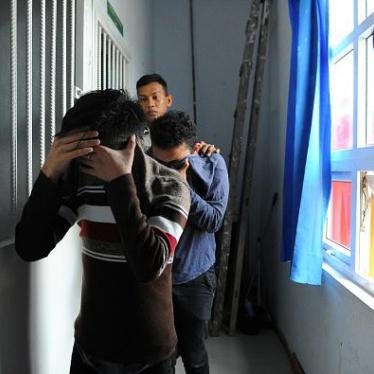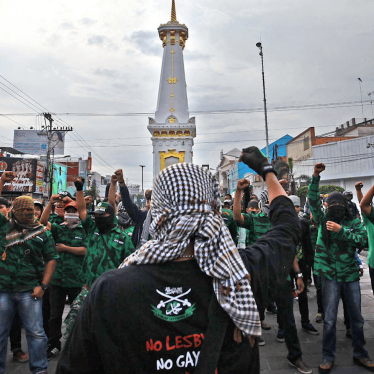(Jakarta) – Indonesian authorities should immediately and unconditionally release four people detained in Aceh under a local ordinance that criminalizes same-sex conduct, Human Rights Watch said today. Under Aceh’s Islamic Criminal Code, they face up to 100 lashes in public – a punishment that constitutes torture under international human rights law.
“These vigilante raids and arbitrary detentions underscore the abusive and discriminatory nature of Aceh’s criminal code,” said Graeme Reid, director of the lesbian, gay, bisexual, and transgender (LGBT) rights program. “Acehnese authorities should release the four and protect the public from marauding vigilantes who target vulnerable minorities.”
In separate raids on March 12 and March 29, 2018 in Aceh’s capital, Banda Aceh, vigilantes detained two individuals each time and turned them over to the Sharia (Islamic law) police (wilayatul hisbah). In the first raid, vigilantes targeted a hair salon and detained a man and a transgender woman who worked there. The Sharia police claim to have found “evidence” of same-sex conduct, including condoms and “transaction money” from the transgender woman.
On March 29, vigilantes forcibly entered a private house and called the Sharia police, who arrested two male college students for allegedly having sex. The Sharia police seized condoms, cell phones, and a mattress as evidence of their alleged “crime.” All four detainees remain in Sharia police custody, pending trial in a religious court.
The vigilantes appear to be neighborhood residents without any known affiliation with militant Islamists in the area. These raids and the risk of punishment involving torture highlight the nexus between the vigilantes and Aceh’s Sharia police in discriminating against suspected LGBT people. In May 2017, after a summary trial, Aceh’s Sharia police publicly caned 83 times two men who had been arrested in a vigilante raid for same-sex conduct.
In January, Aceh police arrested 12 people in raids on five hair salons. Police quickly released three male hair salon customers. However, police beat, kicked, and humiliated nine transgender women employed in the salons by forcing them to roll over in a grass field. Police detained the nine for two nights in what police said was a bid “to normalize” them. Indonesia’s National Police responded by removing North Aceh police chief Untung Sangaji from his post, sending him to be the deputy director of water police in Medan, North Sumatra.
Local government officials in Aceh have actively stoked homophobia.
In 2012 then-Banda Aceh Deputy Mayor Illiza Sa’aduddin advocated harsh punishments for homosexuality, telling the media: “If we ignore it, it will be like an iceberg…Even if one case of homosexuality [is] found, it’s already a problem...[W]e are really concerned about the behavior and activities of the gay community, because their behavior is deviating from the Islamic Shariah.” In 2013, after Illiza was elected mayor of Banda Aceh, she told reporters that “homosexuals are encroaching on our city.” In February 2016, she announced she would create a “special team” to make the public more aware of the “threat of LGBT” and to “train” LGBT people to “return to a normal life.”
Other officials have noted how the raids, arrests, and caning of 2017 were harming Indonesia’s and Aceh’s international image. In July 2017 Governor Irwandi Yusuf said he was concerned that the public flogging of gay men would deter investors, and in February 2018 said he was concerned that Sharia police behavior, including the transgender raids and the flogging of gay men, might affect the government’s public relations program for the Aceh Marathon, due to be held in July 2018.
Aceh is the only one of Indonesia’s 34 provinces that can legally adopt bylaws derived from Islamic Sharia. In 2014, Aceh’s parliament passed the Islamic Criminal Code, which includes discriminatory offenses that are not crimes elsewhere in Indonesia. Consensual sex between two people of the same sex, for example, is punishable in Aceh by up to 100 lashes. Although a 2017 Supreme Court ruling ended the ability of the central government to unilaterally revoke local ordinances, the government of President Joko “Jokowi” Widodo is obligated under international human rights law to prevent torture and punish those who commit it.
The International Covenant on Civil and Political Rights (ICCPR), which Indonesia ratified in 2005, prohibits discrimination based on sex, religion, and other status such as sexual orientation (article 2). It also prohibits punishments such as whipping that amount to torture or cruel and inhuman punishment (article 7).
“The authorities have already flouted the privacy rights of these individuals,” Reid said. “They shouldn’t make things worse by subjecting them to torture.”









